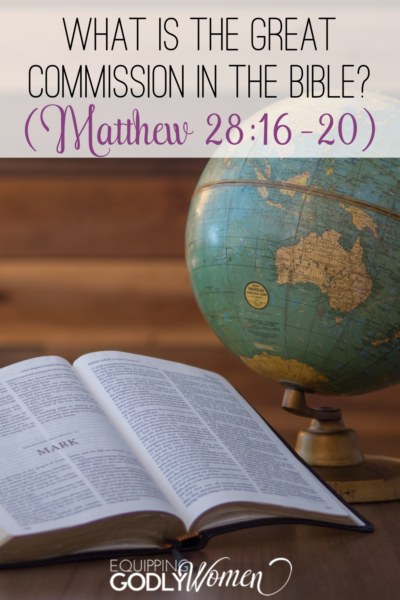Guest Post by Megan Allen
 Have you ever wondered what the Great Commission is all about?
Have you ever wondered what the Great Commission is all about?
At its core, Jesus’ final command invites all believers to join Him in His kingdom work of sharing the gospel message.
There is a bit more to it than that. So today, we will take a look into all the nitty-gritty details. Let’s take some time to gaze into these final words of Jesus to His disciples and uncover the beautiful calling of the Great Commission and its significance in the kingdom of God. I’ll discuss some of the common questions that arise around this topic.
Questions like:
- What is the Great Commission?
- Where is the Great Commission in the Bible?
- Why is it so important?
- How can I participate in the Great Commission?
Where is The Great Commission in the Bible?
While the theme and concepts of the Great Commission are sprinkled throughout the New Testament, the main Great Commission scripture is found in the gospel of Matthew.
“Then Jesus came to them and said, ‘All authority in heaven and on earth has been given to me. Therefore go and make disciples of all nations, baptizing them in the name of the Father and of the Son and of the Holy Spirit, and teaching them to obey everything I have commanded you. And surely I am with you always, to the very end of the age.'” – Matthew 28:18-20 NIV
What is the Great Commission?
Before returning to the Father, Jesus commissioned His disciples to continue the work He had started during His ministry on earth.
All of Jesus’ disciples are called, commanded, and equipped to carry out these instructions. Christ’s commands in Matthew compel us to go into the whole world sharing the message of salvation.
It encourages us to proclaim the good news to the ends of the earth; that forgiveness of sins, eternal life in God’s kingdom, power for godly living, and a grand purpose in God’s mission field are offered to all who place faith in Christ.
Let’s walk through each component Jesus mentions in this final command to His followers.
1. God Commands Us to Make Disciples
This first portion of Christ’s command is to make disciples. Before we dive further, let’s first understand what it means to be a disciple.
In its simplest form, a disciple is a follower or student of a teacher or leader. It’s someone who not only learns from but also seeks to imitate the teachings and example of another.
The apostle Paul shares a great demonstration of this in his second letter to Timothy.
“And the things that you have heard from me among many witnesses, commit these to faithful men who will be able to teach others also.” – 2 Timothy 2:2
A disciple of Christ is a person devoted to following and imitating Him.
Making disciples isn’t just about adding people to the church or sharing religious knowledge; it’s about leading others into a transformative relationship with Christ. It involves introducing people to the person of Jesus and walking alongside them as they grow in their faith. It’s about engaging in meaningful and intentional relationships with the people God has placed in our lives.
2. God Commands Us to Baptize in the Name of the Father, Son, and Holy Spirit
As we continue through the verses of the Great Commission the next command Jesus gives His disciples is to baptize. There are a couple of different words for baptism that have different meanings. Here is some more information.
“The clearest example that shows the meaning of baptism is a text from the Greek poet and physician Nicander, who lived about 200 B.C. It is a recipe for making pickles and is helpful because it uses both words. Nicander says that in order to make a pickle, the vegetable should first be ‘dipped’ (baptô) into boiling water and then ‘baptized’ (baptizô) in the vinegar solution. Both verbs concern the immersing of vegetables in a solution. But the first is temporary. The second, the act of baptizing the vegetable, produces a permanent change.” Outline of Biblical Usage
To baptize means that the object takes on the identity of what it is being baptized into.
What does it mean to baptize others in the name of the Father, Son, and Holy Spirit?
The physical act of water baptism is symbolic of a deeper spiritual reality. When we are baptized, we publicly acknowledge our new identity with each person of the Godhead.
Here’s a quick breakdown of the spiritual significance of being baptized in the name of each person of the triune God.
- Baptism in the name of the Father acknowledges our adoption as His child into the family of God.
- Baptism in the name of the Son acknowledges Jesus as our Lord and Savior.
- Baptism in the name of the Holy Spirit acknowledges the Holy Spirit as the one who indwells, empowers, and teaches us.
As followers of Jesus, we are responsible for performing water baptism and teaching its meaning to others.
3. God Commands Us to Teach Others to Obey Christ’s Commands
The final part of the Great Commission is teaching others to follow and obey the teachings of Christ.
This involves more than just teaching and instructing. It’s about nurturing spiritual growth within an individual and encouraging them to align their thoughts, attitudes, and actions with the principles and values of the Kingdom of God.
Again, this is about discipleship and walking alongside a person in their journey with the Lord.
4. God Wants Us to Have A Partnership With Christ
The final words of our Lord Jesus Christ after presenting the Great Commission were, “And surely I am with you always, to the very end of the age.” Matthew 28:20
The final portion of this message is crucial in helping us understand what specifically Jesus is asking of us. Not only is He commanding us to “go!” but He is assuring His disciples that He will go with them.
The Great Commission isn’t something we do for Christ; it’s something we do with Him. He wants us to partner with Him in building the kingdom of God. The mission that Christ has given us is a high and holy calling.
Thankfully, we don’t have to rely on our own strength to carry out this gospel mission! The power of the Holy Spirit equips and enables us to obey His commands.
Why the Great Commission is So Important
The Great Commission is important because it contains the last words Jesus gave his followers. It is His final instruction to us and a continuation of the work He began. Jesus came to restore people of all nations to a right relationship with the Father. This is the mission He asks us to continue.
We live in a world full of people who, desperately need to hear the message that Jesus has commissioned us to share.
For ‘whoever calls on the name of the Lord shall be saved.’
How then shall they call on Him in whom they have not believed? And how shall they believe in Him of whom they have not heard? And how shall they hear without a preacher? And how shall they preach unless they are sent? As it is written:
‘How beautiful are the feet of those who preach the gospel of peace,
Who bring glad tidings of good things!'” – Romans 10:13-16
God has chosen His people, the church to be the conduit of spreading His gospel of peace to the ends of the earth.
Practical Ways to Live Out the Great Commission
You may be thinking, “Well, this is great information but how can I apply it to my life today?”
These kinds of application questions are important to ask ourselves. For the Word of God to transform us we must diligently seek how the Lord would have us apply His truth to our lives.
Here are some ideas for how to walk in these commands.
1. Pray for Opportunity
Ask the Lord to give you opportunities to share the gospel message. This may sound simple but it is the most powerful way we operate in the Great Commission. Prayer connects God’s kingdom resources to our circumstances and strengthens us with His divine power. We need to seek His counsel and direction in every area of life.
2. Integrate Discipleship into Daily Life
The central message of the Great Commission involves discipleship. As a mom, this integration of discipleship into daily life has become a foundation in my home. So much of my teaching and discipleship happens within my relationships with my children. I think it’s easy for us to focus more on what we would consider “formal” discipleship that we miss the opportunities within the everyday life moments.
Discipleship can take the form of befriending your neighbor, intentionally spending a few extra moments talking with the check-out lady at your local grocery store; or inviting a younger mom or college student over for coffee.
So much of our mission can be lived out as we go about our everyday lives.
3. Be Active In Your Community
Another great way to live out the Great Commission is to find ways to be active and serve in your community! Whether it’s coaching Little League, delivering groceries to a neighbor, or volunteering at a local non-profit, actively engaging your community will open all kinds of opportunities to share the gospel message and walk alongside others.
4. Put Social Media to Good Use
A recent study shows that 49 billion people worldwide use social media.
Digital discipleship is a great way to spread the love of Christ. However, social media is a double-edged sword. While it has good points, it also can become a hub of division and selfish ambition. We must show discretion and self-control and remember that we are Christ’s representatives.
5. Turn Conversations Towards Christ
One of the easiest ways that I’ve found to share the gospel message is by simply turning a conversation towards God-things. As a homeschool mom, I’ve had many conversations with other moms about homeschooling.
Here is an example of a recent conversation I had:
“I wish I could homeschool; I just don’t have the patience”.
My response then turns the conversation towards God:
“Yes, I understand that. I actually don’t have patience for it either. I have to ask God for patience every day.”
Many times these conversations stop there. However, there have been times when my response sparked more questions, and we went on to discuss deeper things.
6. Share Your Testimony
Sharing your testimony is a powerful way to share the gospel message. People may not want to hear quotes from the Bible or argue against scriptures you share with them, but they can’t argue against your own story. Sharing how God has worked in your life can greatly impact the minds and hearts of others.
What a great privilege to join Christ in His work to make disciples! As we participate in the Great Commission, we must remember that we do so with the authority and ability that Christ provides. It requires daily reliance on His strength and guidance.
 Megan Allen is a wife and a homeschool mom of three. When she is not spending time with her family she loves encouraging and equipping other women to study the Bible for themselves. You can find more from her at Megan Allen Ministries.
Megan Allen is a wife and a homeschool mom of three. When she is not spending time with her family she loves encouraging and equipping other women to study the Bible for themselves. You can find more from her at Megan Allen Ministries.
